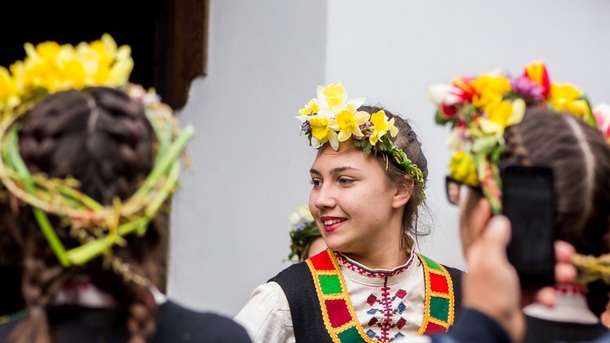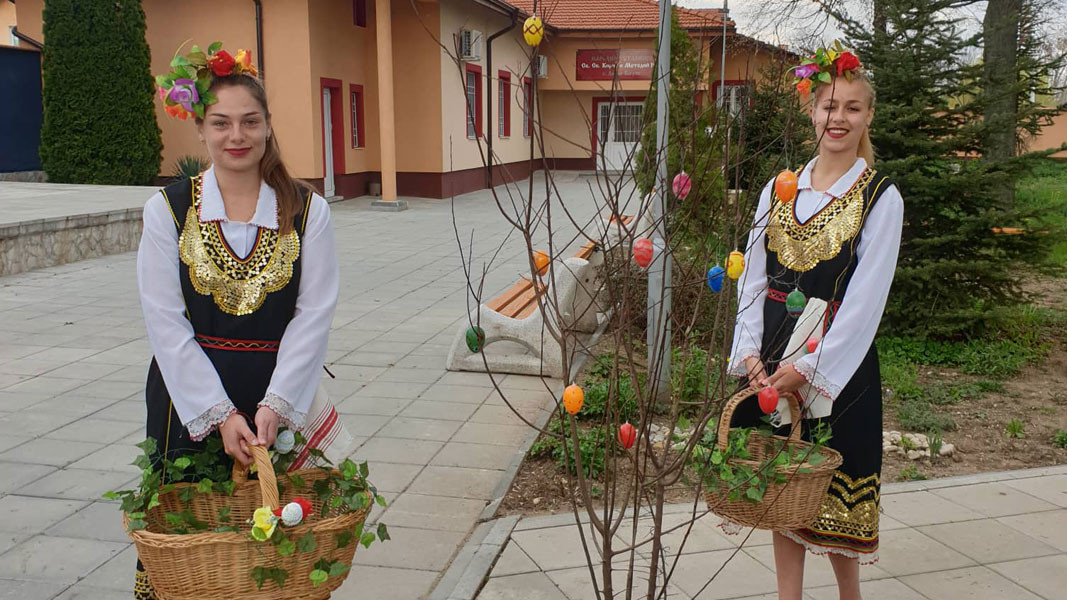Lazarus Saturday is the first of three major Christian feasts linked to the miracle of Resurrection and is followed by Palm Sunday and Easter. It is marked on the Saturday preceding the Holy Week. Lazarus Saturday or Lazarovden in Bulgarian bears the name of Lazarus, who was brought back from the dead through the miracle of resurrection and Christ clearly manifested Himself as Lord of Life and Death. In folk beliefs, Christ's resurrection intertwines with the idea of the spring revival of nature for new life. That's why Lazarovden is a feast of green forests, fields and pastures.
 Traditionally on this day, wreaths of willow branches decorate the doors of homes on Palm Sunday. The most typical Bulgarian custom for this day is called “lazaruvane.” From early morning young unmarried girls called ‘Lazarki’ go from home to home, dancing and singing, wishing for love, good health and fertility. In the past there was a belief that a girl who had not participated in the custom would not get married, so it was obligatory for every teenage girl in a village to take part in the rituals. The special songs dedicated to Lazarus Saturday are not performed on any other day of the year as it was considered bad luck. Upon entering the house, the ‘lazarki’ sing songs for each member of the family. The host gives the girls coins as a symbol of the wish for strong health during the year.
Traditionally on this day, wreaths of willow branches decorate the doors of homes on Palm Sunday. The most typical Bulgarian custom for this day is called “lazaruvane.” From early morning young unmarried girls called ‘Lazarki’ go from home to home, dancing and singing, wishing for love, good health and fertility. In the past there was a belief that a girl who had not participated in the custom would not get married, so it was obligatory for every teenage girl in a village to take part in the rituals. The special songs dedicated to Lazarus Saturday are not performed on any other day of the year as it was considered bad luck. Upon entering the house, the ‘lazarki’ sing songs for each member of the family. The host gives the girls coins as a symbol of the wish for strong health during the year.
The holiday brings a lot of spring mood. Many people, in towns and villages are eagerly expecting to hear the songs of the young girls and welcome them in their homes. This is also how Yordanka Kotseva from the village of Dolni Bogrov near Sofia feels. Her home has always been opened for ‘lazarki’, ‘koledari’ and participants in various ritual games:
"I always invite the lazarki at the table, so they can rest, eat and drink before they go on. It's nice that there are such customs. We are always glad to welcome these dear guests. They come with wishes for health, prosperity – all the good things. In the village we welcome holidays and guests, and live better lives in comparison to the big city where everyone is afraid and locked behind their door."

In the villages near Sofia (the Shoppe region) girls dress in authentic local folk costumes for Lazarovden that include a black dress and beautifully embroidered white shirt, as well as a special belt. On their heads they put on a band decorated with coins and colorful beads. The girls go first to the church to receive blessing from the priest. After that they start visiting the homes of people, being careful not to miss someone. Each group has a master, who differs from others with more lush and rich decorations on her head. "There is continuity between the lazarki and those who know all the songs and steps of the ritual dance teach the younger ones. The new lazarki in the village of Dolni Bogrov this year are girls in the first grade. They are very excited because they will be participating for the first time", says Rumiana Krastanova, secretary of the local community center.
"Four or five rehearsals in the community center are enough for preparation. At 8:00 am on Lazarovden, we gather and have a general rehearsal outside, before separating into groups and starting the tour. The whole day is very festive for the girls. People fill their baskets with white eggs for Easter, candy, fruit and all kinds of treats. They also carry a box in which people place coins. This is one of the most favorite spring holidays for the people in the village as it is recalls of the coming of Easter. "
English: Alexander Markov
Photos: private libraryFebruary 22 marks the 90th anniversary of the birth of Kichka Savova - one of the most significant singers from Bulgaria's Thrace folklore region. All who knew her during her lifetime keep in their hearts the memory of a talented, truly good, bright and..
For the fourth year in a row, the town of Tran in Western Bulgaria will host a winter festival of masquerade games. The beginning will be set on February 3 from 12:00 to 14:00 in the central town square. Four survakari groups from Zemen, Trun and the..
On February 2, according to the Bulgarian folk calendar, it is Petlyovden (Rooster Day) - a day dedicated to the health and fertility of male offspring. It is most widely popular in Eastern Bulgaria. One of the obligatory elements is the..
Eight authentic Bulgarian traditions and skills, passed down through generations, have been added to the National Representative List of Bulgarian..

+359 2 9336 661
